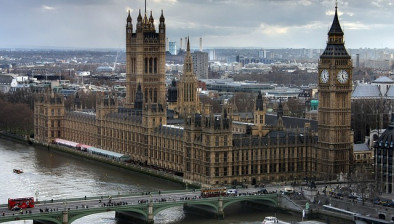Chancellor cuts housing benefit and performs tax credit U-turn

Chancellor George Osborne has scrapped plans to save £4.4 billion by cutting tax credits following wide criticism and a rejection by the House of Lords.
However housing benefit will be cut as part of a £12bn cut to the welfare bill which Osborne promised to deliver over the next five years while balancing the books by the end of the Parliament.
Laying out his Autumn Statement and Spending Review to the House of Commons yesterday, Osborne said: “I’ve had representations that these changes to tax credits should be phased in. I’ve listened to the concerns. I hear and understand them.
“And because I’ve been able to announce today an improvement in the public finances, the simplest thing to do is not to phase these changes in, but to avoid them altogether.”
Universal Credit is being phased in, and the Chancellor said the minimum income floor for the benefit will rise with the minimum wage, which he has called the ‘National Living Wage’.
Deputy first minister John Swinney welcomed the U-turn on tax credits as a victory for the 250,000 families in Scotland who would have been painfully impacted by the cuts but warned that the Scottish Government will see a real terms reduction of almost 6 per cent in the funding for day to day public services over the next four years.
Mr Swinney said: “The Chancellor has continued with ideologically driven austerity of choice. Scotland will see almost 6 per cent of the day-to-day budget that pays for public service slashed as a result of this Chancellor’s statement.
“The Scottish Government has consistently demonstrated that the UK’s deficit and debt can be brought down without the need for huge public spending cuts.
“These cuts are damaging, needless and will hit the poorest hardest.
“What is welcome is the victory over tax credits. 250,000 families in Scotland can breathe a sigh of relief after the proposed cuts were scrapped by the UK government.
“This U-turn demonstrates it was right to maintain pressure on the Chancellor to re-think this damaging proposition.
“We will continue to do everything within our power to protect the most vulnerable from the UK Government’s austerity measures – austerity of choice, not necessity – but we want to use our powers and resources to lift people out of poverty, not just continually mitigate as best we can.
“That will be our focus as we draw up spending plans ahead of the Scottish Budget next month.”
Despite being a devolved issue, CIH Scotland said Scottish housing policy will be “heavily impacted” by changes to welfare policy included in the spending review.
Director Annie Mauger said: “Unfortunately, that impact will be a largely negative one. We will need more time to digest the detail of the Chancellor’s proposals on housing supply and their implications for housing policy north of the border, especially in terms of funding. Our initial view is that, in order to tackle housing supply issues effectively, the primary focus on home ownership needs to be balanced with support for the broadest possible range of housing options that are truly affordable for people on all incomes.”
Mary Taylor, chief executive of the Scottish Federation of Housing Associations (SFHA), said: “We will take soundings from our members regarding the capping of Housing Benefit in the social rented sector so that it can be no more than Local Housing Allowance (LHA). However, we believe that this issue won’t have as significant an impact in Scotland as it might do in some areas of England. Social rents in Scotland are generally lower than LHA levels, even in areas where the private rented market is less buoyant and therefore both private rents and LHA are lower.
“We welcome the government’s announcement regarding Tax Credits.”
Peter Howden, chair of the Glasgow and West of Scotland Forum of Housing Associations, added: “Overall, given the fears many of us shared before the announcement, the Forum believes there was some potentially promising news for housing in Scotland.
“Whilst the 5 per cent revenue cut in the Scottish Government’s overall budget will be challenging to manage, the 14 per cent increase in the capital budget has to be good news for the housing investment programme and the new SG target of at least 50,000 social and affordable homes.
“Additionally, it seems likely there will be Barnett consequentials from the specific housing announcements in England, though we know there may be conditions on how this money can be spent: we note that much of the focus down south is on boosting home ownership.
“The ditching of the Tax Credit cuts is good news not only for the many people who would have been so badly affected, but also for the Scottish Government, which won’t now need to consider whether or to what extent it can mitigate the impact.
“The prospect of limiting Housing Benefit for new social housing tenants to the Local Housing Allowance limit from 2018 could have a particular impact on people under 35, as they will be entitled only to the shared accommodation rate, which is around £60 in many parts of the West of Scotland. However, by then the Scottish Government will have power over the housing element of Universal Credit and so, we presume, will at least have the option of addressing any shortfall faced by tenants. But it is yet another unjustified Housing Benefit cut which we strongly oppose”.
Graeme Brown, director of Shelter Scotland, said: “After decades of neglect, it’s promising that George Osborne has ‘chosen housing’ for his spending review and doubled the budget for house-building, which he cut significantly in 2010.
“This, in addition to the SNP’s own commitment to build 50,000 affordable homes if re-elected, of which we understand around 35,000 will be for social rent, will bring some hope to the 150,000 households across Scotland currently on waiting lists for a home.
“However, (yesterday’s) decision to cap housing benefit at local housing allowance rates will have significant implications for Scotland’s young, single people who will face further difficulty in keeping a roof over their head and will put many at risk of homelessness. This cap could significantly undermine Scotland’s world-leading homelessness legislation which has made great progress in preventing and reducing homelessness in recent years.”
Graeme Brown added: “We welcome measures to increase stamp duty for buy-to-let and second homes, and that this money will be spent to build more homes. We hope the Scottish Government replicates this in Scotland to further increase the supply of affordable homes.”
As Mr Osborne doubled the English housing budget to support 400,000 extra new homes by end of decade, Scottish builders immediately called for an equal commitment on housing north of the border.
Philip Hogg, chief executive of trade body Homes for Scotland (HFS), said: “Whilst we are still absorbing the detail of the Chancellor’s announcement, its sentiment is absolutely clear: to back those who aspire to buy their own home. And the fact of the matter is that, as the Scottish Government’s own research shows, this aspiration applies equally to the majority of Scots.
“Supporting this ambition by stimulating private sector construction will bring wide-ranging benefits, including boosting affordable housing delivery through the direct contribution our industry makes in this area via planning policy.
“The Chancellor has also maintained his commitment to the successful Help to Buy scheme to 2021 and introduced a new tailored version specifically for London. This is in marked contrast to the position here where the announced successor to the Scottish Government’s scheme faces budget reductions of up to 50 per cent and will likely be less accessible to buyers.
“We further note the Chancellor’s intent to remove constraints to allow all sectors to play a role in affordable housing delivery as well as his support for SME home builders on planning and finance, something HFS has been in discussions with the Scottish Government on for many months.
“With Scotland facing the same challenges as elsewhere in the UK, we therefore call on the Scottish Government to broaden the balance of its approach to housing delivery and place equal emphasis on having enough homes of all tenures in the right places to meet the diverse housing needs and aspirations of all those living in Scotland.”
RICS Scotland urged the Scottish Government to emulate the Chancellor’s extension of Help to Buy.
Sarah Speirs, director, said: “Help to Buy has played a significant role in supporting new housing supply benefitting both house builders and first time buyers, and this has helped to generate property-led growth in Scotland’s economy. Ideally, the house building market in Scotland should operate without this “carrot”, but as the Scottish economy recovers it is important that this funding stream continues, with sufficient checks and balance in place to ensure that volume builders do not become overly reliant on this shared equity initiative.
“Furthermore, RICS believes that all property should be used effectivity and efficiently, and we are keen to see action from the Scottish Government to improve the quality of Scotland’s existing stock through investment in maintenance and redevelopment schemes. This would ensure good quality homes which are fit for purpose for future generations, and would provide much-needed support for the supply side of housing which, in turn, will contribute to the revival of the SME sector and local economies.
“With infrastructure spending set to increase, RICS would also like to see this reflected in Scotland – with capital investment steered towards both large and small scale projects. Infrastructure is key to providing utilities and connectivity, unlocking economic growth, and assisting in housing developments becoming communities. Infrastructure provides jobs, integration and, importantly, makes Scotland internationally competitive and a more attractive investment arena”.
Anti- poverty campaigners have welcomed the decision not to implement the proposed changes to the threshold and taper for tax credits.
However, there remains concern that there is still £12bn of cuts being made to the welfare budget and it is unclear how these will actually be made.
Citizens Advice Scotland spokesman, Rob Gowans, said: “We welcome the Chancellor’s decision not to go ahead with the planned changes to tax credits. Around 14 per cent of Scotland’s households receive tax credits, and they’re one of the most common issues that people visit their local CAB for advice about. The planned changes would have meant an increase to the amount of families in low-paid work who struggle to pay living costs, and the reversal of some of these changes to tax credits will be good news for them.
“However the decision to cap Housing Benefit for people who live in social housing is concerning. In 2013, the introduction of the underoccupancy charge caused a rise in people who could not afford to pay the rent, and on top of the imminent lowering of the Benefit Cap, these changes could lead to an increase in people struggling with rent arrears. We would encourage the Government to make sure that vulnerable people and families receive some protection to make sure they are not made homeless.”
Rather than continuing to cut, the Poverty Alliance is calling on the UK government to focus instead on closing the tax gap which is worth an estimated £122bn a year. It is estimated that tax evasion might cost the UK £85 billion a year, tax avoidance could cost £19 billion a year and unpaid tax could result in a loss of £18 billion a year.
Peter Kelly, director of the Poverty Alliance said: “(Yesterday’s) announcement on tax credits is welcome, but families still remain under financial pressure.
“Families will still lose the family element of tax credit, and working age benefits remain frozen until the end of this parliament.
“We are now at the stage where there is nothing to cut. We are hurting the most vulnerable in our society.
“Instead than taking money out of the pockets of the poorest, the UK Government should focus their energies on closing the £122bn tax gap.
“This £12bn of welfare cuts are a matter of choice, not necessity.
“There is a better way, and we believe that closing the tax gap is a part of this.









